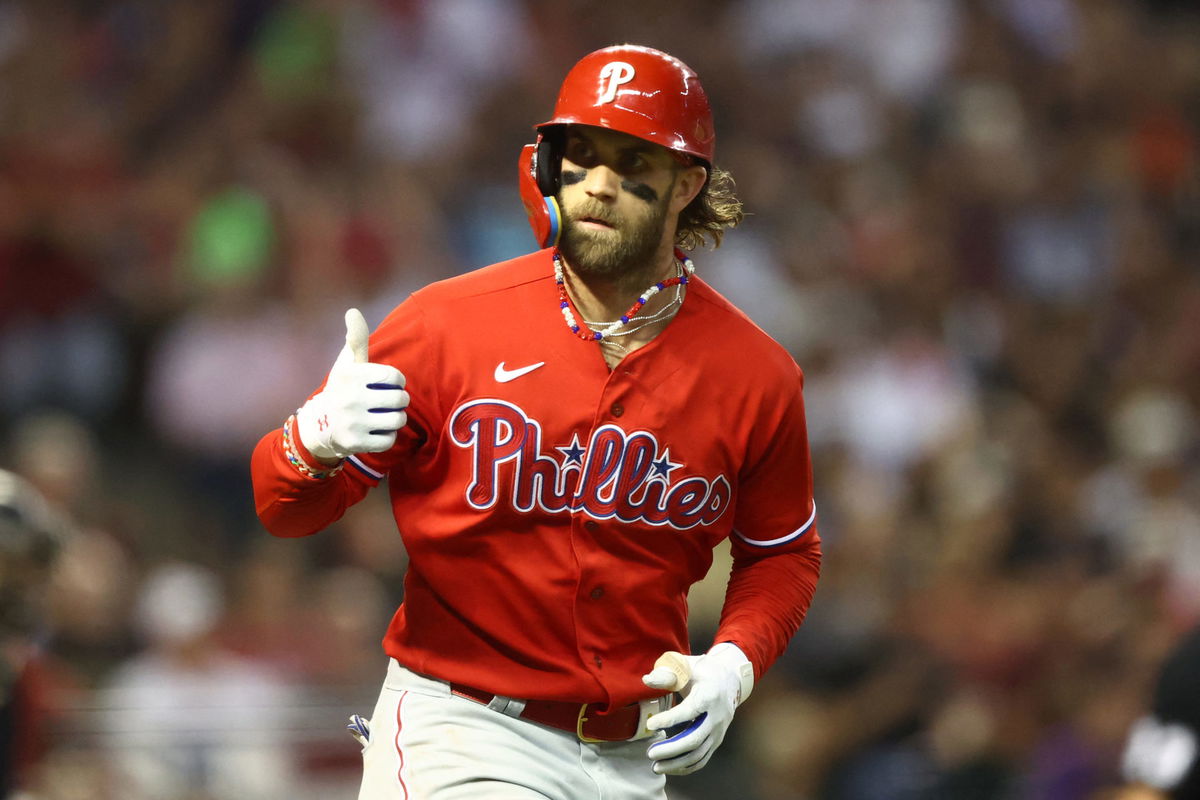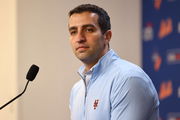
USA Today via Reuters
Oct 21, 2023; Phoenix, Arizona, USA; Philadelphia Phillies designated hitter Bryce Harper (3) reacts after hitting a home run against the Philadelphia Phillies in the sixth inning during game five of the NLCS for the 2023 MLB playoffs at Chase Field. Mandatory Credit: Mark J. Rebilas-USA TODAY Sports

USA Today via Reuters
Oct 21, 2023; Phoenix, Arizona, USA; Philadelphia Phillies designated hitter Bryce Harper (3) reacts after hitting a home run against the Philadelphia Phillies in the sixth inning during game five of the NLCS for the 2023 MLB playoffs at Chase Field. Mandatory Credit: Mark J. Rebilas-USA TODAY Sports
Bryce Harper’s first full season as a first baseman is winding down; what a year it’s been with the Philadelphia Phillies! He’s set to finish in the top 10 for National League MVP voting and could even snag a spot as a Gold Glove Award finalist at first base. Sure, he’s had his ups and downs, battling through some nagging injuries, but he’s still in the run for a World Series ring next month. Now, opponents are starting to see a different side of Harper this year. Turning 32 in October, he’s currently in his 13th season in the majors, and the game has evolved since he first stepped onto the field. Harper has embraced this new vibe in baseball—a younger crowd that celebrates his older and wiser personality rather than punish it.
Watch What’s Trending Now!
He’s truly found his groove at first base, making the position his own. “I feel like “it’s helped me love the game more,” Harper said as per the New York Times, A young player was the first to tell Harper that everyone around the league was buzzing about his swing advice. “What do you mean?” Harper asked, intrigued. The player wanted in, saying, “What you got?” Harper stared him down and replied with a grin, “I ain’t f—king helping you.” They both burst into laughter. In the end, Harper shared some advice—he doesn’t even remember what it was, but it meant a lot because it came from him.
ADVERTISEMENT

Settled at first base, Harper finds joy in paying it forward. “It’s awesome,” he said, adding, “It’s amazing. They’re still kids, man. They’re still kids just playing the game.” If a young hitter stepped into Harper’s office at first base this season, he likely had some advice to share. Sometimes, it was a simple tip on swinging or a congratulatory nod for a player’s debut. Other times, it was just a reassuring word. All of it mattered because it came from Harper—often without prompting.
ADVERTISEMENT
Earlier this month, a young player reached first, and Harper gave him a nod. “Hey, man, everybody around the league is telling me I need to talk to you about my swing,” the player added, chuckling to himself, knowing how this might sound. How could he help an opponent? This isn’t the same game he entered as a wide-eyed 19-year-old, where his self-confidence was seen as a threat.
ADVERTISEMENT
Bryce Harper recalls the stark difference between then and now
Harper recalled his early days, vividly remembering his attempt to break the ice with Buster Posey, one of the greatest catchers of his era. “What’s up, Buster?” a young Harper had called out, full of excitement. But silence hung in the air. Harper felt the sting; “He stoned me,” Harper said, noting, “But then later on in his career, he’s talking to me. That’s just how the game worked.” That moment stuck with Harper, a reminder of the shifting dynamics in baseball.
Harper felt the same way about Chipper Jones, Todd Helton, and Troy Tulowitzki—guys he had idolized and then found himself sharing the field with. He quickly learned they weren’t bad people; they were just upholding a standard. This was the way of the game. Two months into Harper’s career, the Washington Nationals faced off against the New York Yankees. Harper found himself on second base when Derek Jeter made eye contact. “You’re a great player,” Harper remembered Jeter telling him. “You’ll have a great career. Congratulations.” Harper could hardly believe it. “Damn,” he said, shaking his head in disbelief. “That’s Derek Jeter“, and this moment stuck with him.
Top Stories
“We’re the Pittsburgh Pirates”- Mets Radio Host Criticizes Steve Cohen for Duping Queens Fans After Dismantling the Core

Phillies Warned Of ‘Quiet Coup’ on Kyle Schwarber After Philadelphia Star Confirms Exit Plans

Cal Raleigh Sets MLB Rivalries Aside for $29M Cubs Star as He Drops Major WBC Decision for America

Shohei Ohtani Fear Fades as 36-Year-Old Teammate Terrifies MLB Managers Amid Rising Dodgers Dominance

ESPN Insider Loses Faith in David Stearns After Pete Alonso- Jorge Polanco “Headscratcher” Leaves Juan Soto & Mets Vulnerable

It fueled his own desire to pass that same encouragement down to the next generation. Now, Bryce Harper has found joy in reaching out to younger players, just as he once wished Posey had done for him. It was all part of the game’s evolution—an unspoken bond forming across generations, one swing at a time.
ADVERTISEMENT
ADVERTISEMENT
ADVERTISEMENT
ADVERTISEMENT

